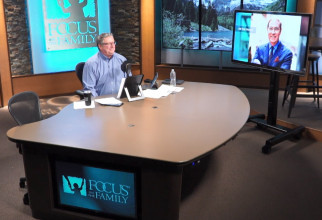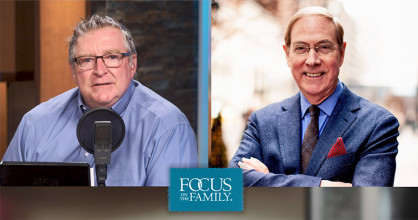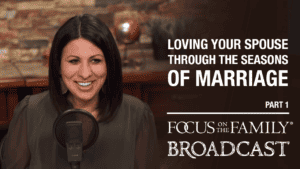
Engaging Hearts and Minds in a Broken Culture
This discussion offers a preview of Volume #16 “Cultures in Conflict” from the That The World May Know video series, available below.
Home » Episodes » Focus on the Family Broadcast » Loving and Serving Your Spouse During the Pandemic
Excerpt:
Dr. Gary Chapman: When we’re conscientious of each other’s love language and we choose to speak it, we create in this crisis a positive emotional atmosphere in our relationship – marriage and with children. And we make things much, much easier when we’re conscious of everybody’s love language and we choose to speak it.
End of Excerpt
John Fuller: We’ve all spent a lot more time than we ever thought possible at home, and it may be that you’ve paid your spouse a compliment. You’ve done something extraordinary to show your love to them. And it really kind of fell flat. They didn’t notice it. And it may be that you’re really starting to have some friction in your marriage. If that’s the case during this coronavirus season, stay tuned. We have some great encouragement for you from Dr. Gary Chapman. I’m John Fuller. This is Focus on the Family and your host is Focus president and author Jim Daly.
Jim Daly: John, I think the label we’re reaching for is this is almost like that bad Western The Good, the Bad and the Ugly under coronavirus and sheltering-in-place. There’s some good things that are going on. I know for Jean and I and the boys, we’re connecting like we’ve never connected before. We were up late last night playing Balderdash, you know, ‘til like 11:00 p.m. We haven’t done that I think ever. So, you know, our bedtime is about 9:30. But, uh, you know, there’s some good things. And then there’s the friction points that you mentioned where we’re kind of moving out to the corners of the house to get a little time alone. You know, read the Word, pray, maybe just do a video game. I don’t know. But, you know, just space that you need as a human being. And then the ugly. (Laughter) Which for us tends to be around unmet expectations. And we’re going to deal with some of that today with, I think, the country’s leading expert when it comes to marriage relationships, and that’s Dr. Gary Chapman. He’s the author of the bestselling book The Five Love Languages. That book has sold millions of copies. I think I’ll ask him how many, but it’s millions. And when he’s not sequestered at home, he speaks to thousands of couples nationwide through his weekend marriage conferences. Gary and his wife Karolyn have been married for over 50 years. So that right there qualifies him – forget the PhD. He’s also associate pastor at Calvary Baptist Church in Winston-Salem, North Carolina. And Dr. Chapman, thank you for being on here with us at Focus on the Family.
Gary: Well, it’ s good to be with you guys today. Looking forward to our conversation.
Jim: Well, how is it going for you? And are you finding anything extraordinary in these extraordinary circumstances that we’re in?
Gary: (Laughter) Well, it’s going well for us, actually. You know, it’s just Karolyn and I in the house now. I mean, we don’t have kids still at home, of course. And we like each other.
Jim: So, there’s no diversion. You really right at it.
Gary: Yeah. (Laughter) Yeah, but we like each other and that’s good.
Jim: (Laughter).
Gary: (Laughter) It goes a long ways.
Jim: Well, I know in times past we’ve talked about how good a vacuumer you are.
Gary: Oh, yes.
Jim: So maybe you’re in a lot of vacuuming.
(Laughter)
Gary: Washing dishes. Taking out the trash. Karolyn’s cooking. I can’t cook, but I can wash dishes.
Jim: (Laughter).
Gary: And that’s her love language, so long as I wash the dishes and vacuum the floors and take out the trash, she’s a happy woman and she tells me I’m the greatest husband in the world. (Laughter)
Jim: Well, see, over – after 50 years, you know, your job description. That’s great.
Gary: That’s right.
Jim: Some of us are still floundering.
(Laughter)
Jim: Hey, let me ask you, Gary, a crisis like this, the coronavirus, it’s certainly like I said in the setup there – it certainly can bring couples closer together or it can reveal some cracks in that foundation. You know, if you put light under that concrete, you can see these cracks. And I think in some cases that’s happening. And you know what? It’s not all one way or the other. I know for Jean and I, we’re experiencing that. I’d say its 90% good and, in some cases, great. We’re spending time reading the Word together and praying more together. That’s wonderful. That’s how we’re starting our day. And we haven’t always had the time to do that. But you know what? Easter was a little challenging because she had some certain expectations of how the day should go. And I think the boys and I kinda, you know, we had a nice meal. We prayed together. We watched The Passion of the Christ and we did some things to acknowledge Easter, but I think, you know, it didn’t meet Jean’s expectations. So, you know, that created some frustration. But speak to that issue of how, you know, these kinds of times, albeit unique – it can surface some things that aren’t too good.
Gary: Well, it can. Let me before I do that, Jim, share our Easter experience.
Jim: OK. Good.
Gary: We had a North Carolina country funeral. Here’s the way we did it. (Laughter) It was Karolyn’s sister-in-law who died. And the three children decided that they would sit on the front porch where their mom and dad often would sit and they get word out to all their friends that if you wanted to express your, you know, concerns for her and the family, just drive by, honk the horn, and they would wave at you.
Jim: Oh, my goodness.
Gary: So, Karolyn and I went down and we were on the porch with them. And it was great. It was all kind of people drove by and honked the horn. (Laughter)
Jim: So sweet. That’s – that’s a creative way of celebrating someone’s life. I mean, that’s great.
Gary: Yeah, absolutely. Absolutely. We do all we have to do. But no, you’re exactly right. I think what happens in a crisis like this when we’re kind of thrown together, it reveals what was already there. I mean, if we had a good strong relationship, then we’re gonna work it out. You know, we’re gonna make it work. We’re gonna find out ways and things and – and really, it can be a wonderful experience. But if we already had a fractured relationship, then this is very, very difficult because all the things that were under the surface are now coming to the top.
Jim: Right.
Gary: And our irritations are, you know, really surfacing. And we’re probably saying unkind things to each other. Snapping at each other. And we make it even worse. So, to me, sometimes if you’re in a fractured relationship, the place to start might be just to kind of call a truce…
Jim: Yeah.
Gary: …And say, “Honey, you know, let’s not let’s not go down this road. Why don’t we call a truce?” And here here’s the other part of it. “Why don’t we individually ask God to show us where we have failed and let’s apologize to God and let’s apologize to each other? And then let’s – let’s begin to make things better.” Sometimes you have to tear the wall down and really acknowledge, you know, failures before you can begin to make things better.
Jim: No, it’s a great example. But you know what you’re expressing there. And I’m going to ask you in a moment to give us the refresher on the five love languages, which was a brilliant stroke on your part, let me tell you. But what you’re expressing there is a choice, and this is what makes it within our control. But it also – I don’t know why it works against our better judge to allow those things to fester, to react. And I do it, too. Don’t – I don’t want to paint a picture like I do it perfectly well. I try to do it better than I did yesterday and that’s a goal. But let’s speak to that common thing, Gary. You have counseled thousands of couples. Why is it so hard to treat your spouse with love and respect and do those things that you just expressed?
Gary: Yeah.
Jim: “Honey, let’s call a truce to this. Let’s find a different way. Let’s communicate differently. I want to love you. I don’t want to stick a dagger into your emotional heart every day.” Why do we do that, Gary?
Gary: Well, you know, the short answer is because we’re sinners. (Laughter)
Jim: Yeah.
Gary: And we’re self-centered. But I think also in our culture, we’ve been trained to give more attention to our emotions than to our attitudes and behaviors.
Jim: Huh.
Gary: And so, we kind of live by our emotions. And we say – we even say things like, “You’ve got to be true to your emotions. You’ve got to be true to your feelings.” Well, you know, listen, there’s nothing wrong with feelings. We all have them – negative and positive. But feelings are not designed to control our behavior and our attitude. And we don’t choose feelings. They just grab us. But we choose our attitude and we choose our behavior. And that’s what I think we have to rediscover as individuals. Yes, I may have negative emotions about something that they did or didn’t do or the way they did it. But what is the best thing for me to do in the light of that? And think before we respond. But yeah, I think the problem, of course, is basically underneath all of that is that we are by nature selfish and our ways the right way. And we want other people to do what we think they ought to do. And that’s not gonna happen forever.
Jim: Absolutely. Well, let’s get to it. Many people will know the five love languages. They’ve put it into practice. And it’s I hope encouraged them in their marriages, et cetera. But for those that aren’t familiar with it, give us the five. How many books has sold? I know that’s uncomfortable to answer that question. But seriously, how many?
Gary: (Laughter) The original book that has sold over 13 million copies in English and been translated in over 50 languages from around the world.
Jim: I mean, it’s amazing. How did you how did you come into the awareness of this five love languages?
Gary: It grew out of my counseling. Couples would sit in the office and one would say, “You know, I just feel like he doesn’t love me, or she doesn’t love me.” And the other would say, “I don’t understand that. You know, I do this and this and this. Why would you not feel loved?” And I knew people were sincere and they were missing each other. They were they were in their mind expressing love, but it wasn’t connecting. So eventually, Jim, I sat down and read several years of notes that I made when I was counseling and asked myself when someone said, “I feel like my spouse doesn’t love me. Why did they want? What were they complaining about?” And their answers fell into five categories. I later called them the five love languages and started using that in my counseling. But if you want her to feel loved, you’ve got to speak her language. If you want him to feel loved, you got to speak his language. And sometimes, Jim, they would come back in three weeks and say, “Gary, this is changing things.”
Jim: Huh.
Gary: “This is really changing things.” And then I start using in small groups. And the same thing happened. Probably five years later I thought, “If I could put this concept in a book, write it in the language of the common person, leave out the psychological jargon. Maybe I could help a lot of couples I would never have time to see in my office.” So that’s the background.
Jim: Well, it’s proven to be an amazingly effective tool to help human beings understand themselves and better love those who they have chosen to love. That’s what’s amazing. Well, let’s get into it. What are the five? Refresh our memory.
Gary: No particular order. Words of affirmation is one. Using words to affirm the other person. “You look nice in that outfit. I really appreciate what you did. You know, one of the things I like about you?” It’s just looking for things that you can actually verbally affirm to the person. You can speak the words. Write the words. I guess you could sing the words, but it’s just using words to affirm the other person. And then…
Jim: And now in that context, Gary, we can say, “I love the way you disinfect the counter.”
(Laughter)
Gary: Absolutely. Absolutely. And we can express appreciation for whomever is doing the cooking in the house now. (Laughter)
Jim: That’s for sure. That’s for sure. What’s the second one?
Gary: Words of affirmation. Then there’s acts of service. Doing things for the other person that you know they would like for you to do. That’s my wife’s. And that’s why I said earlier that I vacuum floors and take out trash and wash the dishes. You know, the old saying, “actions speak louder than words.” If this is their love language, that’s true. Actions do speak louder than words. And then there’s gifts. It’s universal to give gifts as an expression of love. The gifts say, “They were thinking about me. Look what they got for me.” And the gift doesn’t have to be expensive. You know, I said to a husband the other day, “You know, you’re taking walks. OK, that’s good. If you see a bird feather, why don’t you pick it up and take it home to your wife? And say, ‘Honey, I found this today and I thought about you. You know, you are the wind beneath my wings, girl.’” Whoo!
(Laughter)
Jim: Okay. That’s a homerun. My wife whose a pet fanatic, she would love that. But there may be some wives that would go, “Ick. What are you doing?”
(Laughter)
Gary: You can say, “You can throw it away if want to, buddy. I still love you.”
Jim: That’s so good.
Gary: But there’s gifts. And then there’s quality time. Giving them your undivided attention. And I don’t mean sitting on the couch watching TV together or both of your computers separately. I mean, computers are set down. We’re not answering the phone right now. We’re just spending time with each other. Just sharing life with each other.
Jim: Yeah.
Gary: And it doesn’t always mean sitting on the couch talking. You can be taking a walk down the road together. You could actually, you know, be out in the yard, kind of, watering the flowers together. The important thing is not the flowers. The important thing is we’re doing something together that at least one of us enjoys…
Jim: Right.
Gary. …And the other is doing it because they want to be with us. So quality time. And then physical touch. And we’ve long known the emotional power of physical touch. And in a marriage, this is such things as holding hands; kissing; embracing; the whole sexual part of marriage; arm on the shoulder; riding down the road, put your hand on their leg; sitting around the house and they walk by, and you trip them. You know? (Laughter)
Jim: No. No. But it’s true. It’s good to define that.
Gary: (Laughter) Not that one. Not that one.
John: This is Focus on the Family with your host Jim Daly. I’m John Fuller. Our guest today is Dr. Gary Chapman, who, as you can tell, has written and spoken extensively about the five love languages. And we do have some of Gary’s excellent resources available for you. We also have an entire page of – well, several pages actually online of Covid-19 resources to help you and your family during this difficult time that we’re all going through together. You’ll find all of those resources and you can reach out to us if you’d like on the phone as well. Our website, focusonthefamily.com/broadcast or our number is 800, the letter A and the word FAMILY.
Jim: Gary, before we get into this connection to our current shelter-in-place, the coronavirus being closer than ever to the ones you love. And we want to give it that context. Let’s also mention the love tank concept, which goes to compliment these five love languages. What is the love tank?
Gary: You know, I like to picture inside every child there’s an emotional love tank. And if the child feels loved, if the love tank is full, then the child grows up emotionally healthy. If the child does not feel loved, if the love tank is empty, then the child will grow up with many internal emotional struggles and in the teenage years will often go looking for love. Typically, in all the wrong places. But I believe that adults also have an emotional love tank. And I’m using the concept of a gasoline tank in the car. You know, if it’s full, you can drive a long ways. If it’s empty, you’re not going anywhere.
Jim: Mm.
Gary: And – and since love is one of the deepest emotional needs we have as humans, when we keep the love tank full in a marriage, then we can process everything else in life much easier. But if the love tank is empty and you feel like they don’t love me. They wish they weren’t married to me. Life looks pretty dark. And it’s much more difficult to process everything else in life.
Jim: And that’s a great concept for us as spouses to remember you’re trying to fill up your – your spouse’s love tank. I just – I really appreciate that concept. Let’s move to the five love languages. And again, in the context of being sheltered-in-place, being around each other a lot. Words of affirmation. In this context, how do we do that sincerely without overdoing it? I’m seeing that with Jean. I mean, I’m complimenting her on the meals in front of the boys which she really appreciates because she wants her young guys to respect her as mom and what she does for the family. But sometimes, too, you can maybe overdo that to where it lacks a bit of sincerity. So, speak to that. Words of affirmation while we’re sheltered-in-place and how we got to do that well.
Gary: You know, Jim, I go back to I think it’s Proverbs 18, verse 21. This says, “Life and death is in the power of the tongue.”
Jim: Hmm.
Gary: We can kill people, or we can give them life by the way, we talk to them. And in these days, when we’re in this crisis, you know, negative words to a person whose love language is words of affirmation, it’s like a dagger in their heart.
Jim: Hmm.
Gary: I mean, it can kill the relationship. So, I think we have to – and for some who have it, who didn’t receive words of affirmation growing up, it’s harder for them to speak words of affirmation. It doesn’t come natural. They have to learn it. I’ve actually said to some husbands, “Write down something you could say to her and stand in front of a mirror and say it, you know. And then just walk in one day and say it.” So, it’s not – it takes effort for people who haven’t learned to speak these languages growing up. But in terms of sincerity, you don’t have to feel everything that you say. That is, you don’t have to have real positive feelings that motivate you to say something. You say something because you know it’s gonna help the other person. That’s what love’s all about. It’s not something for you. It’s something for them.
Jim: Yeah.
Gary: You know, I don’t – I don’t get warm, bubbly feelings for taking out the trash or washing dishes.
Jim: (Laughter).
Gary: You know? But I get a deep sense of satisfaction that I’m doing something that communicates to her that I love her. You know, I’m – washing dishes is a small thing, you know, to communicate my love to her. So, I think it may seem abnormal and it may seem to a person who hasn’t been doing it before, that it’s – you’re kind of making it up or, you know, you’re working hard. You don’t really feel that. But I think it’s a choice. And I’ve said, too, because sometimes I’ve had wives say, “You know, well, he’s doing these things for me, but I don’t think that he really wants to.” So, feelings are important, but we don’t start with feelings. We start with an attitude. I want to enrich their life. I’m going to – I want to do something. I want to be a loving person. That when they encounter me, they’re gonna encounter someone that’s trying to do something to enhance their lives.
John: You know, Gary, thinking about quality time and that aspect of the love languages, my wife is definitely a quality time person. Our kids are older, but we’re finding that they are still hanging around a lot. I mean, for good reason, obviously. But how do we have quality time when, now I’ve got to juggle work, and kids in the home and the shelter in place isn’t exactly a walk in the park for the two of us.
Gary: (Laughter) Yeah, well, I think – I think you’re right. And that’s why I would say like with a quality time person, now that we’re all in the same house and everything’s going on – look for those opportunities when the two of you can just take a short walk together or go out on the porch and sit in the chairs together while the kids are in the house or maybe the kids are out taking a walk. But when we’re conscious of each other’s love language and we choose to speak it, we create in this crisis a positive emotional atmosphere in our in our relationship – marriage and with children. And we make things much, much easier when we’re conscious of everybody’s love language.
John: Yeah.
Gary: And we choose to speak it.
Jim: Gary, let me ask you about acts of service. I mean, again, in this context, what are some things we can do that demonstrate that act of service? I mean, I think for Jean, I talk to her about talking with you today. I always confess that, you know, I’m going to be talking to Gary Chapman. So, what do I need to work on, Jean? So, she had a quick list for me.
(Laughter)
Jim: But, you know, she said, “Well, you know, one of the things you’ve done I’ve noticed in this circumstance of shelter-in-place is you’ve been a lot quicker to help me around the house. You’re doing the dishes often.” Which, yeah, she noticed. Yay! Um – um – but I, you know – I can do more than that. There are some other things that I could do that would be helpful. I think she’s appreciated the fact I painted a room. I painted a wall. I’ve done a lot of yard work.
Gary: Ooh. Yeah. Yeah. That’s big.
Jim: So, uh, you know, I think those things – kind of helping around the nest, if I could describe it that way. I think wives are always appreciative of husbands who are keeping the nest in order and doing the things that they would like to do, especially if they don’t have to ask you to do them.
Gary: Mm hmm.
Jim: So, what should we be thinking about with acts of service?
Gary: I think if you know that your spouse’s language is acts of service, this is a time to ask periodically, “Honey, what could I do today or tomorrow that would be really helpful to you?” Because you may as well spend your energy doing the thing that’s on the top of their list.
Jim: Right. (Laughter)
Gary: You know, you may have an idea that what you would like to do, but if you ask them, “Out – you know, how would you score these two or three things? Which is most important?” For example, right now, the last week and a half, my wife has been changing her closet from the winter closet to the summer closet. Okay.
(Laughter)
Jim: And the winter clothes that are on the first floor now have to go upstairs. And so, I said, “Well, honey, I’m here. I’ll help you do that.” So, she’s been, you know, putting them together what she wants taken upstairs. I take them upstairs, you know, and put them up there. Man, you know, it’s great. But I would not – I would not have thought about doing that. But she told me she wanted to do that, and I said, “Wonderful!” So, asking, you know, how – on all the language is asking, “How could I express my love to you? What be most meaningful to you today?” Yeah. They’ll have an idea.
Jim: I mean, you know, what’s convicting here as I notice you don’t have a sixth love language is “the gift of input.”
(Laughter)
Jim: Cause my – you know, my instinct is to say, “Hey, hon, why do you go to all that work to create two closets? Let’s just put everything – let’s just stuff it into one closet.”
John: Downsize. Yeah.
(Laughter)
Jim: And then I don’t know how to help you move clothes every season.
(Laughter)
Jim: But that’s not one of the love languages – “the gift of input.”
Gary: Well, you know, here’s a game that I sometimes encourage people to do and maybe every week or so just say to your spouse, “Honey, on a scale of zero to 10, how full is your love tank?”
Jim: Mm.
Gary: And they say anything less than 10, you say, “Well, what can I do to help fill it today?” And they give you an idea. Now you have a choice. You can do it or not do it. It’s not manipulation. They’re just giving you information. Uh, but when you do it, you’re speaking to them. And sometimes they won’t always choose something in their primary love language. Sometimes there’s something else that they would like for you to do that would fill the tank. So, yeah, just keeping it on the front burner. That’s little – that little approach does that.
Jim: It’s true, Gary. And as we end here, I wanted to ask you again with your years of experience, when you counsel these couples and you’ve seen the pattern of – of the short comings and where couples stumble even to the point of divorce and breaking off something that God intended for them to have as a lifelong relationship of commitment, of learning, of growing. All of those years of experience for you. Speak to one or two of those core things that couples need to be aware of if they really want to go the distance. If they want to honor the Lord in their vows that they made to one another. If they want to stay in love for their lifetimes. What are one or two things that are most critical that you’ve learned?
Gary: Jim, I think the two things I would say that are essential to a long-term healthy marriage. One is we do have to meet the emotional need for love. And that’s where what we’ve been talking about, the five love languages, is so helpful because it tells us how to meet that emotional need for love over the long haul. And so that’s important. The second I think that is essential is we have to deal effectively with our failures because none of us are perfect.
Jim: Hmm.
Gary: Uh, you know, and you don’t have to be perfect to have a long-term, healthy marriage. But we do have to deal with our failures. And that involves apologizing and forgiving.
Jim: Yeah.
Gary: And without apology and forgiveness, we will not have a long-term healthy marriage. We might have a long-term marriage that we can stay married. But it will not be healthy. We’ll be like roommates living in the same house. Just trying to stay away from each other. But if we deal with our failures, we’re willing to apologize, and we’re willing to forgive the other person when they apologize, we keep the walls torn down between us. Those two things, I think, are really the two essentials.
Jim: Gary, that is so good. And man, the time has flown by. And we haven’t really gotten to all the things I want to ask you. If you’re able and you don’t have the excuse that you’ve got to go somewhere, because you’re locked in your house.
(Laughter)
Jim: Can we can we go in a few more minutes, and I’ll just let the listeners know to go online, and we’ll just do this as a web extra? You can go to the Focus on the Family website. And let’s go through a few more questions. Are you willing to do that?
Gary: Yeah. Yeah, that’s fine. That’s fine.
Jim: OK, let’s do it. And then you can get off to the vacuuming and the dishwashing real quick.
Gary: Okay. (Laughter).
Jim: But you have been wonderful, Gary. It’s always good to have you on. And I’m so grateful for the intentional discernment that you have applied in your vocation to learn how we as human beings function in this world. What Scripture has to say about it as a pastor and then combining all that into great advice to help us love better which I know is your goal. And thanks for doing it so very well.
Gary: Well, thank you, Jim. I always enjoy chatting with you. Appreciate what you and Focus on the Family is doing for the American Family.
John: And we want to encourage you to get a copy of Dr. Gary Chapman’s book The Five Love Languages. It’s kind of the seminal work. It’s the one that started so many of us down this path of a better understanding of our spouse. We’ve got copies of it and additional resources as well. All that focusonthefamily.com/broadcast. Or if you’d like, call us. Our number is 800, the letter A and the word FAMILY. And if you can make a generous contribution of any amount to support the ongoing work of Focus on the Family which only seems to have intensified these days with the crisis and the shelter-at-home and all the extra family time as we’ve talked about, we would appreciate so much your financial contribution. And we’ll say thanks by sending a copy of Dr. Chapman’s book to you. Again, our number, 800, the letter A, and the word FAMILY. Well, be sure to join us for the continuation of this conversation online and, uh, in the meantime, plan to be with us next time, won’t you? As we once again help you and your family thrive in Christ.

Dr. Gary Chapman is the senior associate pastor at Calvary Baptist Church in Winston-Salem, N.C. He’s also an international public speaker and the best-selling author of numerous books including The Five Love Languages which has sold more than sevenmillion copies and has been translated into nearly 40 languages. Dr. Chapman holds several academic degrees including a Ph.D. in adult education from Southwestern Baptist Theological Seminary. He and his wife, Karolyn, have been married for over 50 years and have two grown children.

Receive Dr. Gary Chapman's best-selling book The 5 Love Languages for your donation of any amount!

The Focus on the Family Marriage Assessment is designed to evaluate the strength of 12 essential traits of your marriage. Do you know your marriage's strengths and weaknesses?

Visit our online store and purchase a CD of today's program for yourself or to share with a friend.

Focus on the Family offers a one-time complimentary consultation from a Christian perspective.

Are the coronavirus, quarantines and uncertainties putting a strain on your marriage? Here are ways to fight the fear and grow closer to your spouse.

We discover the primary love language of our spouse, and we choose to speak it whether or not it is natural for us. Love is a choice.

The next several weeks won't be easy. But there are things you can do to lower the stress level and find peace during the coronavirus quarantine.

Best-selling author Gary Chapman addresses conflicts that arise when expectations meet reality in marriage, and provides steps to better communicate with and love your spouse. (Part 1 of 2)

Best-selling author Gary Chapman addresses conflicts that arise when expectations meet reality in marriage, and provides steps to better communicate with and love your spouse. (Part 2 of 2)

Amid the busyness of life, Erin Smalley incorporates simple affirmation into her marriage relationship and watches her husband thrive.

Dr. Gary Chapman talks about giving gifts and the importance of physical touch for married couples during the coronavirus pandemic.

Dr. Gary Chapman explains how faith and science complement, rather than contradict, one another.

This discussion offers a preview of Volume #16 “Cultures in Conflict” from the That The World May Know video series, available below.

Debra Fileta will help couples better understand the four seasons of healthy relationships, what to expect during each one, and how to carefully navigate them for a stronger marriage. (Part 1 of 2)

Debra Fileta will help couples better understand the four seasons of healthy relationships, what to expect during each one, and how to carefully navigate them for a stronger marriage. (Part 1 of 2)

Larnelle Harris shares stories about how God redeemed the dysfunctional past of his parents, the many African-American teachers who sacrificed their time and energy to give young men like himself a better future, and how his faithfulness to godly principles gave him greater opportunities and career success than anything else.

Amy Carroll shares how her perfectionism led to her being discontent in her marriage for over a decade, how she learned to find value in who Christ is, not in what she does, and practical ways everyone can accept the messiness of marriage and of life.

Pastor Dave Carder offers couples practical advice for protecting their marriages from adultery in a discussion based on his book Anatomy of an Affair: How Affairs, Attractions, and Addictions Develop, and How to Guard Your Marriage Against Them. (Part 1 of 2)